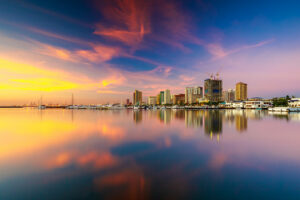ECONOMIC GROWTH in the Philippines and the rest of Southeast Asia is seen to continue on an expansionary path until 2025, Moody’s Analytics said.
“Growth will accelerate in Southeast Asia, supported by trade, investment, consumption, generally stimulatory fiscal policy, and, by early next year, easing monetary policy,” Moody’s Analytics Chief Asia-Pacific Economist Steven Cochrane said in a commentary.
“The Philippines and Indonesia will not lag far behind Vietnam, but their economies are not as closely tied to the global economy,” he added.
Moody’s Analytics expects Philippine gross domestic product (GDP) to expand by 5.9% this year, 6% next year, and 6.1% in 2026. This would fall short of the government’s 6-7% growth target for 2024, 6.5-7.5% for 2025, and 6.5-8% for 2026.
The Philippine economy expanded by 6.3% in the second quarter, faster than 5.8% in the first quarter and 4.3% in the same period a year ago. This was also the fastest growth since 6.4% in the first quarter of 2023.
In order to meet the lower end of the government’s 6-7% target band this year, GDP would need to expand by at least 6% in the second semester.
Moody’s Analytics said it is optimistic about the growth in the overall Asia-Pacific (APAC) region.
“The outlook for the APAC economy in 2025 is good, even though economic growth in China and India will likely slow over the coming year,” Mr. Cochrane said.
“A slow improvement in global trade, robust investment spending, and continued consumer spending will drive economic expansion in the region,” he added.
For the Philippines, Mr. Cochrane said that there must be an “aggressive push” to ramp up infrastructure in order to support growth.
The Marcos administration plans to spend 5-6% of GDP on infrastructure annually.
The latest data from the Budget department showed that infrastructure spending jumped by 20.6% year on year to P611.8 billion in the first half of the year.
The Philippines “must stick to its plans and execute well,” Mr. Cochrane said.
“Fiscal policy in the Philippines is strongly focused on infrastructure development, but actual execution of this policy has been uneven this past year,” he added.
The government has approved 186 flagship infrastructure projects worth P9.6 trillion so far.
Meanwhile, Moody’s expects Philippine headline inflation to settle at 3.5% this year, a tad higher than the Bangko Sentral ng Pilipinas’ (BSP) 3.4% full-year forecast.
Inflation accelerated to 4.4% in July, though the central bank said that inflation is seen to trend downward to settle within the 2-4% target band in the coming months.
For 2025, inflation is seen to settle at 3.2%, also slightly higher than the BSP’s 3.1% forecast.
On the other hand, Mr. Cochrane flagged risks to the growth outlook for the region, such as weaker consumer sentiment in China, geopolitical risks, and the upcoming US elections.
“Should Donald Trump win the presidency, it would lead to higher tariffs on goods imported by the US from China and much of the rest of the world,” he said.
However, he noted that since the Philippines is a less export-sensitive economy, it “faces much less risk in the Trump-election scenario.”
CREDIT RATINGMeanwhile, Moody’s Ratings last week affirmed the Philippines’ investment grade rating of “Baa2” with a “stable” outlook.
“The ratings affirmation reflects a range of factors. The government’s passage of a series of reforms to liberalize the economy to attract foreign investment over the past several years will support the Philippines’ high medium-term growth potential,” it said in a statement on its website.
The credit rater said its affirmation was also due to expectations that “fiscal consolidation will resume with the debt burden to remain higher than pre-pandemic levels but comparable to similarly rated peers over the medium term.”
The government is targeting to bring the debt-to-GDP ratio to 60.6% and deficit-to-GDP ratio to 5.6% by yearend.
However, Moody’s also cited risks such as weakening debt affordability due to elevated interest rates, exposure to climate risks, and geopolitical uncertainties, among others.
BSP Governor Eli M. Remolona, Jr. welcomed Moody’s affirmation of the Philippines’ credit rating. “We are taking a measured approach in safeguarding price stability conducive to sustainable economic growth,” he said.
Finance Secretary Ralph G. Recto said the investment grade rating allows the government to secure more affordable financing.
“These will create more quality jobs, increase incomes, and reduce poverty incidence in the country,” Mr. Recto said in a statement.
The government is aiming to achieve an “A” rating status by the end of the administration.
Earlier this month, Japan-based Rating and Investment Information, Inc. upgraded the Philippines’ investment grade rating to “A-.” — Luisa Maria Jacinta C. Jocson


















